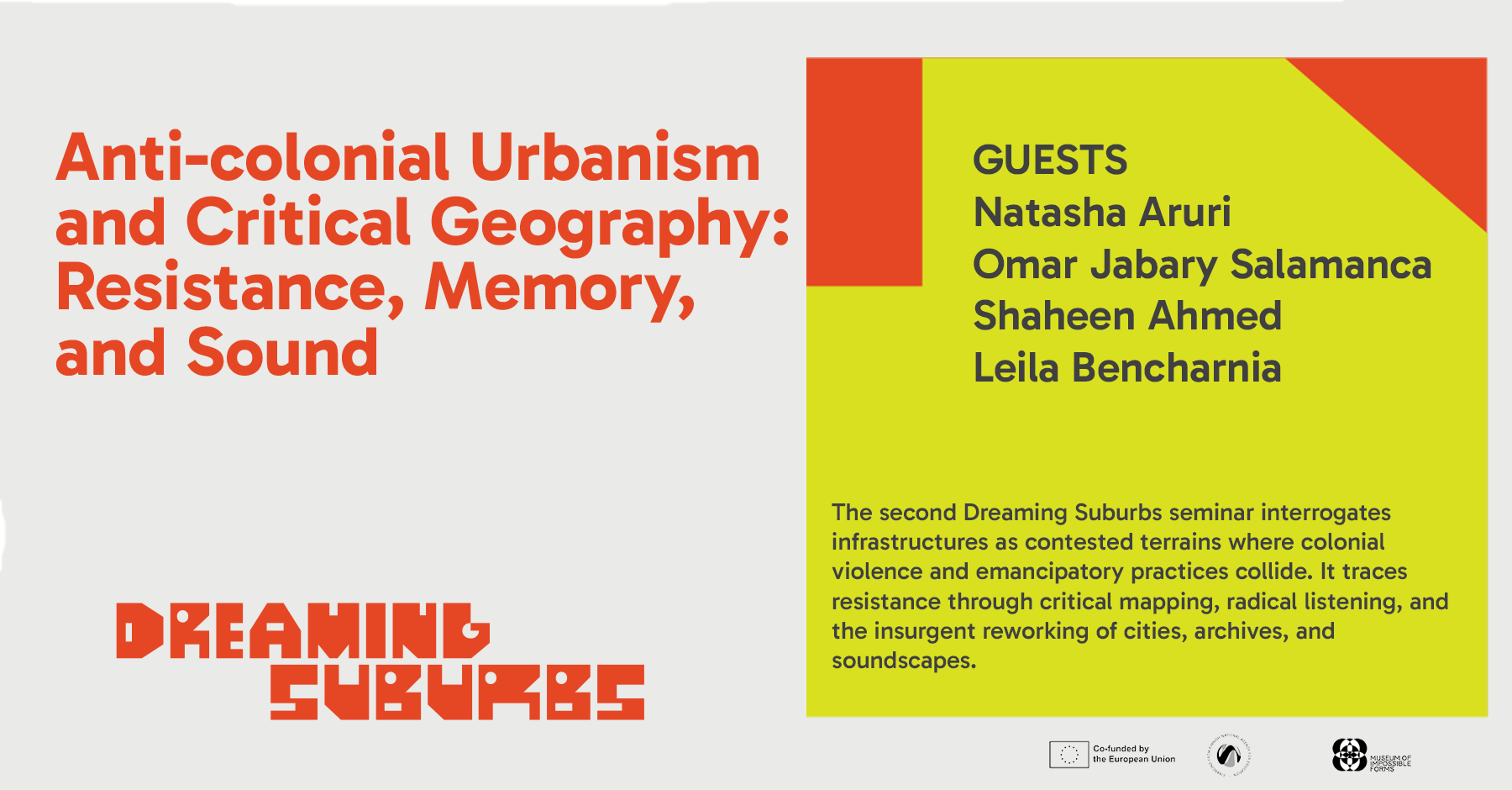

Tuesday, September 23rd, 2025 | 15:00 - 20:00
Museum of Impossible Forms, Aallonhalkoja 9 L1, 00540, Helsinki
About the seminar
Dreaming Suburbs (2024–2026) is an international collaboration at the intersection of art, activism, and urban planning. Co-funded by the EU Creative Europe programme, the project brings together Konsthall C, Konstfrämjandet Stockholm, Museum of Impossible Forms, Til Vægs, and FEMMA Planning.
Grounded in local neighbourhoods, Dreaming Suburbs challenges segregation policies and explores how art can act as a critical and generative force in shaping more just and sustainable urban futures. Through residencies, seminars, an exhibition, a festival, and a publication, the initiative connects artists, urbanists, activists, and residents to reimagine the social and spatial dynamics of our cities.
The second Dreaming Suburbs seminar, Anti-colonial Urbanism and Critical Geography: Resistance, Memory, and Sound, interrogates infrastructures — material, spatial, and sensorial — as contested terrains where colonial violence and emancipatory practices collide. From critical mapping to radical listening, the programme explores how practices of resistance are inscribed in cities, archives, and soundscapes.
Urbanist and architect Natasha Aruri reflects on mapping as a tool for confronting the spacio-politics of (neo)colonialism; urban geographer Omar Jabary Salamanca examines the politics of urban infrastructures and settler colonialism. Dreaming Suburbs artist-in-residency Shaheen Ahmed shares a filmmaking practice engaging with memory, faith, and intimacy, while sound artist Leila Bencharnia closes the day with a performance that foregrounds decolonising listening as a way of engaging with social and political complexity.
Together, these contributions ask how infrastructures — urban, social, and sonic — can be re-imagined as grounds for social, ecological and spatial justice.
The seminar is curated by Giovanna Esposito Yussif / Museum of Impossible Forms and supported by the EU Creative Europe programme and the national co-financing from the Finnish National Agency for Education (EDUFI).
15:00 – Open doors
15:15 – Lecture by Natasha Aruri
Natasha Aruri is an urbanist and architect. Her work focuses on the spacio-politics of and resistance to (neo)colonialism, particularly through dynamic, people-based visual methods for confronting injustices and risks. She is co-founder/director of UR°bana, an interdisciplinary research and design studio that leads the implementation of the Takhayali project in Palestine as part of the multisite research project Urbanization, Gender and the Global South (2017–2024). She was Postdoctoral Researcher and Coordinator at K LAB, TU-Berlin (2019–2023), where her work addressed the intersection of critical mapping and socio-spatial transformation. She has served as Professor of Urban Planning at Dessau Institute of Architecture (2018–2020), as a visiting lecturer at several universities, and as a consultant to development agencies. Publications include the commentary Infrastructures of Resistance: Anticolonial Education and Practices (2025), the book Critical Mapping for Municipalist Mobilization: Housing Struggles in Belgrade, Berlin, Barcelona (2024), the online book Mapping Change Logbook (2022), and the chapter Re-imagine Urban Antispaces! for a Decolonial Social Reproduction (2021).
16:30 – Lecture by Omar Jabary Salamanca
Omar Jabary Salamanca is an urban geographer and the co-director of the Observatory of the Arab and Muslim Worlds and a research fellow at REPI (Recherche et Etudes en Politique Internationale) at the Université libre de Bruxelles. He is also a research associate in the Department of Conflict and Development at Ghent University. His research and teaching focus on political economy, political ecology, and science and technology studies, particularly in Palestine and the Middle East. He is also interested in global histories and archival practices of anti-colonial solidarity movements. Omar has published several scholarly articles, books chapters and edited compilations on themes related to the politics of urban infrastructures, settler colonialism and development studies. He is currently completing a book on the political lives of infrastructures in Palestine to be published by Verso Books. Omar serves on the editorial board of Arab Urbanism and Jadaliyya Cities, the international advisory boards of Antipode and ACME and the reading committee of Regards. He is also a steering committee member of the International Critical Geography Group, a co-founder of the Eye On Palestine Arts and Film Festival and a member of The Kitchen collective.
17:30 – Break
18:00 – Practice sharing by Shaheen Ahmed (Dreaming Suburbs artist-in-residency, Museum of Impossible Forms)
Shaheen Ahmed is a filmmaker from the Malabar Coast of Kerala, South India. His work explores memory and identity, particularly at the intersection of faith, intimacy, and collective spiritual imagination. A graduate of the DocNomads documentary filmmaking programme (Lisbon, Budapest, Brussels), Ahmed’s practice weaves stories, rituals, and gestures into moving-image works that trace overlooked geographies of displacement and belonging.
19:00 – Sound performance by Leila Bencharnia
Born in Morocco, Leila Bencharnia is a sound artist, acousmatic interpreter, and musician based between Milan, Berlin, and Morocco. Daughter of a traditional Moroccan musician, their dialogue with sound began in the village near the Atlas Mountains where they grew up. Their sonic work, composed of analogue materials including tapes, vinyls, and synthesizers, recognises radical listening as a modality of knowledge transmission. Bencharnia’s practice seeks to decolonise listening as a way of engaging with social and political complexity.
Museum of Impossible Forms is an accessible venue.
The language for the seminar will be English.
Funded by the European Union. Views and opinions expressed are however those of the author(s) only and do not necessarily reflect those of the European Union or the European Education and Culture Executive Agency (EACEA). Neither the European Union nor EACEA can be held responsible for them.
